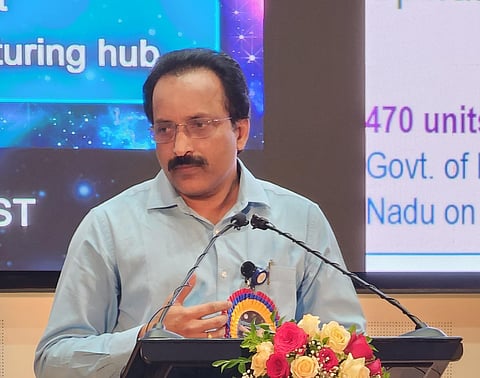

THIRUVANANTHAPURAM: The Indian Space Research Organisation (ISRO) is developing a rocket named Next Generation Launch Vehicle (NGLV) to replace its ageing workhorse the Polar Satellite Launch Vehicle (PSLV) that was developed in the 1980s.
This was announced by ISRO chairman S Somanath at a press conference on the sidelines of the 'Engineers Conclave 2022' at the Liquid Propulsion Systems Centre (LPSC) at Valiyamala here on Thursday.
"PSLV was developed in the 1980s and it does not serve the needs of the 2020s. There needs to be an evolution," Somanath said. While refusing to give an exact time frame for retiring PSLV, he said that ISRO will stop using the rocket after completing the remaining launches approved by the government.
Asked specifically about propulsion technology to be used in the NGLV, Somanath said it will use 'semi-cryogenic' technology which is both efficient and cost-effective. He hinted that the new rocket could also be 'reusable'. "A reusable rocket will have a smaller payload than an expendable one. If it is reusable, the payload will be around five tonnes and if it's expendable, it will go up 10 tonnes," he added. Somanath said the payload parameters were arrived at after analysing the current market requirements.
Somanath said the participation of the industry was essential right from the beginning of the new rocket's development. This would ensure that capability is created outside ISRO to build, operate and launch it on a commercial basis. "It is possible for the industry to support and create this rocket (NGLV) as a national asset that can be operated for a sufficient period of time," he said earlier while speaking at the conclave.
ALSO WATCH |
Somanath said ISRO is also engaged in discussions with the Union Agriculture Department to develop a 'Bharat Krishi satellite' to study the growth pattern of crops, identify irrigation deficiencies and provide information that will help in pest-control and verification of farm insurance claims besides many other applications.
"We will give support to the Agriculture department. The satellites will be owned and operated by them. A minimum of two satellites will be needed to ensure proper re-visit capability," he added.
The ISRO chairman said the space agency is exploring the possibility of increasing civilian use of the country's indigenous satellite navigation system NaVIC. However, he admitted that the efforts have not given any tangible outcome.
"It is penetrating slowly into the civilian sector. But the primary goal of NaVIC continues to remain as a service to the strategic sectors," he reminded.